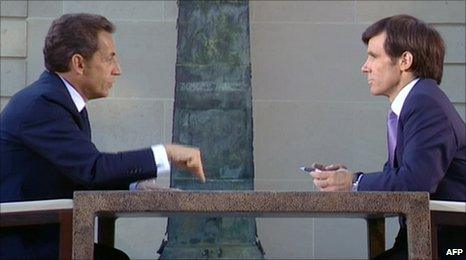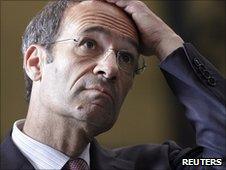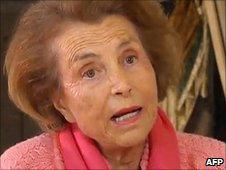Sarkozy battles to shake off Bettencourt scandal
- Published

President Sarkozy was interviewed by France 2 TV at the Elysee palace
President Sarkozy believes he has turned a corner with his spirited rebuttal of the charges laid against his government in the Bettencourt financial scandal.
In his live interview on France 2 television, the president turned on his attackers - accusing them of resorting to slander to undermine his pension reform plan.
He said it was no surprise that the allegation that he had received large sums in illegal donations from the L'Oreal heiress should emerge now - just as he and Labour Minister Eric Woerth were about to unveil a bill that will raise the retirement age to 62.
Tough reforms always ruffle vested interests, he said, and often their only weapon in response is a campaign of personal abuse.
However his task as president was to see the vital reforms through, he said, and he was sure most of the public had more pressing worries than the claims and counter-claims affecting a small Paris elite.

Eric Woerth has been cleared of helping Mrs Bettencourt evade taxes
On the face of it, the president does have a case.
Two separate developments over the past days lend support to the argument that he and Mr Woerth may have been unfairly traduced.
First of all, the accountant who alleged that Mr Sarkozy had personally received envelopes of cash from Liliane Bettencourt's financial manager retracted part of her claims.
She said that she had never mentioned the president's name in her interview with the Mediapart news website. That part, she said, had been made up.
And second, a report hastily compiled at the tax inspectorate exonerated Mr Woerth from the accusation that he intervened to give special treatment to Mrs Bettencourt.
Secret tapes
The origin of the scandal that has so shaken the government lay in secret tapes of conversations between the 87-year-old Mrs Bettencourt - France's richest woman - and her financial team.
From these it emerged not only that Mrs Bettencourt had evaded French tax by parking part of her fortune abroad, but also that she had close links with Mr Woerth - who as budget minister up until March this year was the man in charge of collecting French taxes.
Mr Woerth's wife, Florence, worked for the company that managed the Bettencourt money, and it was claimed in the tapes that she only got the job after a personal request from her husband.
The allegation was that the minister had turned a blind eye to Mrs Bettencourt's financial irregularities in return for favours - specifically, donations to the ruling UMP party of which Mr Woerth is also treasurer and chief fund-raiser.
The tax inspectorate report, by stating that Mr Woerth had never played any role in Madame Bettencourt's tax assessments, appeared to clear his name.
That is certainly the view of President Sarkozy, who said in his interview that Mr Woerth was an "honest, competent man whose dignified response to three weeks of slander did honour to the political profession".
The president hopes that with politics about to go on hold for the summer break, the affair will be quickly forgotten.
"In their overwhelming majority, French politicians are clean," he said.
However it is unlikely that the fall-out from the Bettencourt affair will dissipate as quickly as he would like.
For a start there are still many unanswered questions.
The accountant may have dropped Mr Sarkozy's name from her list of beneficiaries of Madame Bettencourt's largesse. But others remain.
In particular she persists in her claim that at a dinner Mr Woerth was given 150,000 euros ($189,000; £125,000) in cash for Mr Sarkozy's 2007 election campaign.
There are also suspicions about the two developments that appear to support the government's case.

Liliane Bettencourt's fortune is put at about 17 billion euros
Was the accountant leant on to retract her claim against Mr Sarkozy?
Was the tax inspectorate report that exonerated Mr Woerth truly independent? Many in the opposition have their doubts.
The president has now restated unambiguously his confidence in the labour minister - meaning that it will be Mr Woerth who sees through the highly contested pensions plan in the weeks and months ahead.
Already the proposals have brought millions on to the streets, and with the public mood souring because of budget cuts and growing unemployment there is every chance of a "hot" autumn of protest.
What many in France would like to know is why the government did not see this coming?
If tough reforms are indeed the president's mission, and if pensions are the most important of those reforms - then how could he have got it off to such an appalling start?
- Published12 July 2010
- Published7 July 2010
- Published7 October 2013
- Published1 July 2010